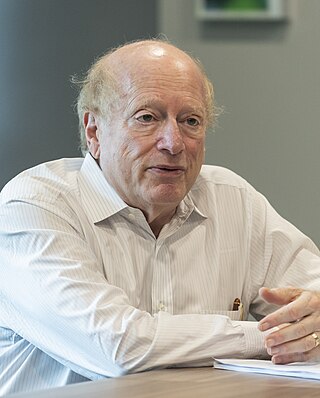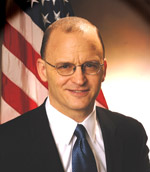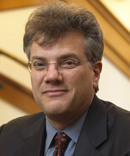Related Research Articles

The Benjamin N. Cardozo School of Law is the law school of Yeshiva University in New York City. Founded in 1976 and now located on Fifth Avenue near Union Square in Lower Manhattan, the school is named for Supreme Court Justice Benjamin N. Cardozo. Cardozo graduated its first class in 1979. An LL.M. program was established in 1998. Cardozo is nondenominational and has a secular curriculum, in contrast to some of Yeshiva University's undergraduate programs. Around 320 students begin the J.D. program per year, of whom about 57% are women. In addition, there are about 60–70 LL.M. students each year.
Bivens v. Six Unknown Named Agents, 403 U.S. 388 (1971), was a case in which the US Supreme Court ruled that an implied cause of action existed for an individual whose Fourth Amendment protection against unreasonable search and seizures had been violated by the Federal Bureau of Narcotics. The victim of such a deprivation could sue for the violation of the Fourth Amendment itself despite the lack of any federal statute authorizing such a suit. The existence of a remedy for the violation was implied by the importance of the right violated.

Mark Victor Tushnet is an American legal scholar. He specializes in constitutional law and theory, including comparative constitutional law, and is currently the William Nelson Cromwell Professor of Law at Harvard Law School. Tushnet is identified with the critical legal studies movement.
Michael C. Dorf is an American law professor and a scholar of U.S. constitutional law. He is the Robert S. Stevens Professor of Law at Cornell Law School. In addition to constitutional law, Professor Dorf has taught courses in civil procedure and federal courts. He has written or edited three books, including No Litmus Test: Law Versus Politics in the Twenty-First Century, and Constitutional Law Stories. He is also a columnist for Findlaw.com and a regular contributor to The American Prospect. Dorf is a former law clerk to Justice Anthony Kennedy of the U.S. Supreme Court and Judge Stephen Reinhardt of the United States Court of Appeals for the Ninth Circuit.
In the United States, qualified immunity is a legal principle of federal constitutional law that grants government officials performing discretionary (optional) functions immunity from lawsuits for damages unless the plaintiff shows that the official violated "clearly established statutory or constitutional rights of which a reasonable person would have known". It is comparable to sovereign immunity, though it protects government employees rather than the government itself. It is less strict than absolute immunity, which protects officials who "make reasonable but mistaken judgments about open legal questions", extending to "all [officials] but the plainly incompetent or those who knowingly violate the law". Qualified immunity applies only to government officials in civil litigation, and does not protect the government itself from suits arising from officials' actions.
Richard A. Bierschbach is dean and professor of law at Wayne State University Law School. He became Wayne Law's 12th dean on August 17, 2017. He previously taught at Yeshiva University Benjamin N. Cardozo School of Law in New York, where he also served as vice dean.

David D. Cole is the National Legal Director of the American Civil Liberties Union (ACLU). Before joining the ACLU in July 2016, Cole was the Hon. George J. Mitchell Professor in Law and Public Policy at the Georgetown University Law Center from March 2014 through December 2016. He has published in various legal fields including constitutional law, national security, criminal justice, civil rights, and law and literature. Cole has litigated several significant First Amendment cases in the Supreme Court of the United States, as well a number of influential cases concerning civil rights and national security. He is also a legal correspondent to several mainstream media outlets and publications.

Michael J. Klarman is an American legal historian and scholar of constitutional law. Currently, Klarman is the Kirkland & Ellis Professor at Harvard Law School. Formerly, he was James Monroe Distinguished Professor of Law, Professor of History, and Elizabeth D. and Richard A. Merrill Research Professor at the University of Virginia School of Law.

Gregory G. Garre is an American lawyer who served as the 44th United States Solicitor General from June 19, 2008, to January 16, 2009. He is currently a partner at Latham & Watkins, a private law firm.

Richard H. Pildes is the Sudler Family Professor of Constitutional Law at the New York University School of Law and a expert on constitutional law, the Supreme Court, the system of government in the United States, and legal issues concerning the structure of democracy, including election law. His scholarship focuses on public law and legal issues affecting democracy.
Ziglar v. Abbasi, 582 U.S. ___ (2017), is a Supreme Court of the United States case in which the Court determined, by a vote of 4–2, that non-U.S. citizens detained in the aftermath of the September 11 attacks cannot recover monetary damages from high level federal officials for the conditions of their confinement. The case was consolidated with Hastey v. Abbasi, and Ashcroft v. Abbasi. It was argued on January 18, 2017.
Ashcroft v. Iqbal, 556 U.S. 662 (2009), was a United States Supreme Court case which held that plaintiffs must present a "plausible" cause of action. Alongside Bell Atlantic Corp. v. Twombly, Iqbal raised the threshold which plaintiffs needed to meet. Further, the Court held that government officials are not liable for the actions of their subordinates without evidence that they ordered the allegedly discriminatory activity. At issue was whether current and former federal officials, including FBI Director Robert Mueller and former United States Attorney General John Ashcroft, were entitled to qualified immunity against an allegation that they knew of or condoned racial and religious discrimination against Muslim men detained after the September 11 attacks. The decision also "transformed civil litigation in the federal courts" by making it much easier for courts to dismiss individuals' suits.

Joseph Louis Rauh Jr. was one of the United States' foremost civil rights and civil liberties lawyers. In his early career, he served as a lawyer in the Franklin D. Roosevelt administration and a clerk to Supreme Court justices Benjamin N. Cardozo and Felix Frankfurter. He co-founded the liberal organization Americans for Democratic Action, and was a key lobbyist for civil rights legislation from the 1940s to 1960s.

Samuel Robert Bagenstos is an American attorney and academic who is the General Counsel of the United States Department of Health and Human Services. From January 2021 until June 2022, he served as the general counsel for the Office of Management and Budget. He is a former law professor at the University of Michigan, a job he returned to after serving for two years as the principal deputy assistant attorney general in the United States Department of Justice Civil Rights Division under Attorney General Eric Holder and Assistant Attorney General Tom Perez.
Allan Ides is an American lawyer, the Christopher N. May Professor in the Loyola Law School of Loyola Marymount University, Los Angeles, California and was a visiting professor at the University of Southern California, Gould School of Law, for Fall 2011. From 1989 through 1997, Ides was a faculty member at Washington and Lee University School of Law.
Ashcroft v. al-Kidd, 563 U.S. 731 (2011), is a United States Supreme Court case in which the Court held that U.S. Attorney General John D. Ashcroft could not be personally sued for his involvement in the detention of a U.S. citizen in the wake of the September 11, 2001 attacks in the United States.

Cornelia Thayer Livingston Pillard, known professionally as Nina Pillard, is an American lawyer and jurist serving since 2013 as a U.S. circuit judge of the United States Court of Appeals for the District of Columbia Circuit. Before becoming a judge, Pillard was a law professor at Georgetown University.

Paul Bender is an American attorney, author, judge, and former dean of the Arizona State University college of law. He was formerly a professor at the University of Pennsylvania Law School. Over his career Bender has argued more than 20 cases before the United States Supreme Court. He is often cited as an expert in constitutional law.
Jonathan Franklin Mitchell is an American lawyer, academic, and legal theorist who served as the Solicitor General of Texas from 2010 to 2015. He has argued seven cases before the Supreme Court of the United States. Mitchell has served on the faculties of Stanford Law School, the University of Texas School of Law, the George Mason University School of Law, and the University of Chicago Law School. In 2018, he opened a private solo legal practice in Austin, Texas.
Aziz Z. Huq is an American legal scholar who is the Frank and Bernice J. Greenberg Professor of Law at the University of Chicago Law School. He is a scholar in the areas of constitutional law, federal courts, and criminal procedure. His work in constitutional law principally focuses on individual rights and liberties under the U.S. Constitution.
References
- 1 2 3 4 5 "Cardozo School of Law Faculty Profile: Alexander A. Reinert". Archived from the original on 2010-05-30. Retrieved 2010-04-21.
- ↑ Alex Reinert, Arguing Ashcroft v. Iqbal: A View from the Lectern Archived 2010-06-25 at the Wayback Machine
- ↑ Ashcroft v. Iqbal